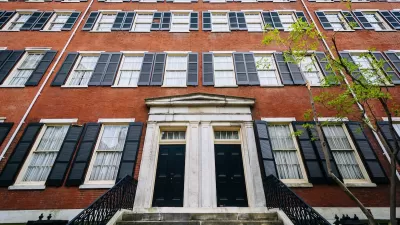A policy report from the Philadelphia Coalition for Affordable Communities made news for recommending policies to disincentive, with taxes, real estate speculation. The report also includes raw data on the transformation happening around the city.
"Last week, the Philadelphia Coalition for Affordable Communities (PCAC) released a policy report that contained some startling figures about displacement caused by gentrification in Philadelphia," reports Max Marin.
Noting that previous media coverage of the report by Plan Philly and the Philadelphia Daily News focused on the policy recommendations included in the report—namely that the city should enact a new "anti-speculation tax" to tax house flippers—Marin instead focuses on the data findings in the report that inspired the policy recommendation.
"Econsult helped conduct the research report, titled 'Development without Displacement: Keeping Communities Strong,' [pdf] using census data from 2000 to 2012. To our knowledge, it’s the first report of its kind that looks at factors and conditions of Philadelphia’s changing demographics over such a long period. It even offers a first-time estimate as to how many are being displaced from their homes, community spaces, businesses, and social networks."
Findings from the 12 years under study include:
- "the African-American population in gentrifying areas of South and West Philadelphia decreased by 29 percent, and by 22 percent in North Philadelphia."
- "'Housing cost-burdened' households were at 52 percent in 2012. That’s a citywide increase of 10 percent. The 7th District, which is largely Latino, saw a city-high 20 percent increase in housing-cost burdened households in those years."
- "West Philadelphia’s median home sale price increased 98%, twice the city rate; South Philadelphia’s median sale price increased 184%, more than three times the citywide rate; North Philadelphia’s median sale price increased 200%, nearly four times the citywide."
FULL STORY: The hard data on gentrification and displacement in Philly

Planetizen Federal Action Tracker
A weekly monitor of how Trump’s orders and actions are impacting planners and planning in America.

Maui's Vacation Rental Debate Turns Ugly
Verbal attacks, misinformation campaigns and fistfights plague a high-stakes debate to convert thousands of vacation rentals into long-term housing.

Restaurant Patios Were a Pandemic Win — Why Were They so Hard to Keep?
Social distancing requirements and changes in travel patterns prompted cities to pilot new uses for street and sidewalk space. Then it got complicated.

Charlottesville Temporarily Has No Zoning Code
A judge ordered the Virginia city to throw out its newly revised zoning code, leaving permitting for new development in legal limbo.

In California Battle of Housing vs. Environment, Housing Just Won
A new state law significantly limits the power of CEQA, an environmental review law that served as a powerful tool for blocking new development.

Boulder Eliminates Parking Minimums Citywide
Officials estimate the cost of building a single underground parking space at up to $100,000.
Urban Design for Planners 1: Software Tools
This six-course series explores essential urban design concepts using open source software and equips planners with the tools they need to participate fully in the urban design process.
Planning for Universal Design
Learn the tools for implementing Universal Design in planning regulations.
Heyer Gruel & Associates PA
JM Goldson LLC
Custer County Colorado
City of Camden Redevelopment Agency
City of Astoria
Transportation Research & Education Center (TREC) at Portland State University
Jefferson Parish Government
Camden Redevelopment Agency
City of Claremont





























